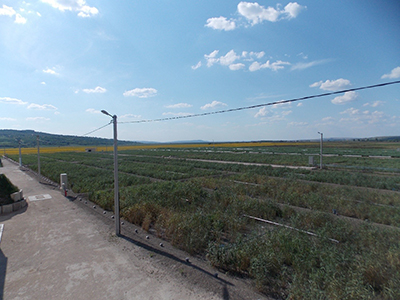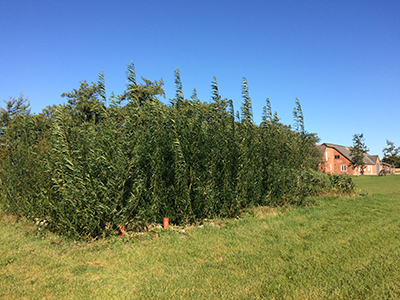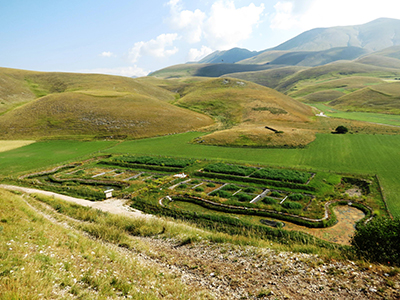French Reed Bed (FRB) is a CW developed in French and highly innovative in Indian context. FRB advantage is the not need of any primary treatment (no septic tank, only grit removal), reducing even further O&M cost of nature-based solutions for wastewater treatment (no yearly sludge removal). Indeed sludge is accumulated on top of the FRB, creating a sludge layer that grows with a rate of 1-2 cm per year. The sludge is removed every 10-15 years when they are well stabilized and are suitable for reuse in agriculture as soil amendment. PAVITR will test the use of a single stage FRB (usually the French systems use two stages) optimized to provide an effluent suitable for fertigation, recovering in a easy and cheap way valuable nutrients from the wastewater.
 |
|
| Masi, F., Bresciani, R., Martinuzzi, N., Cigarini, G. and Rizzo, A., 2017. Large scale application of French reed beds: municipal wastewater treatment for a 20,000 inhabitants town in Moldova. Water Science and Technology, 76, 1, 68-78, 2017. | Castelluccio: it's another FRB that we designed, inserted in an Italian protected National Park (therefore nice picture) and of significant scale (1000PE). It was also studied, in particular in terms of O&M cost reduction: data are published and you can refer to the paper in the website (Rizzo, A., Bresciani, R., Martinuzzi, N. and Masi, F., 2018. French Reed Bed as a Solution to Minimize the Operational and Maintenance Costs of Wastewater Treatment from a Small Settlement: An Italian Example. Water, 10(2), p.156.) |

Short Rotation Plantation System (SRP)
Willow and Bamboos.
Using wastewater for energy production gives a good opportunity to recycle resources and to solve complex environmental problems. This approach is the main task of ecological engineering, which deals with sustainable technologies. Energy forests have been pointed out as one of the most suitable ecological solutions for wastewater treatment. Energy forests have been pointed out as one of the most suitable ecological solutions for wastewater treatment having a low degree of treatment intensity and a high degree of recycling. During PAVITR a Short Rotation Plantation (SRP-System) will be designed to treat domestic wastewater with diverse Indian Native and EU-Exported species of Willows and Bamboos.

Willow bed evapotranspiration systems can treat on-site wastewater effluent with the advantage that, if sized correctly, they produce no discharge either to ground or to surface water. Willow beds are a viable alternative to conventional treatment methods, when for example, in situ soil is of too low a permeability to allow for treatment / disposal via percolation or when a discharge of treated/untreated effluent to a watercourse is not permitted. Diverse willow bed systems will be constructed as pilot trials at AMU University in Aligarh to treat the domestic wastewater produced. The systems will be built with the idea of evaluating different parameters with respect to overall performance including effluent type, willow varieties and aspect ratios of the basins. The effluent flow into the basins, water level, rainfall and evapotranspiration will be monitored on each site to assess the effectiveness of the system. The overall aim is to produce guidelines for the design of such on-site treatment systems in India.
The SRP system is planned to produce marketable products and also to study them as input material for energy production in a gasification process. Biomass gasification is a thermo-chemical conversion of biomass into a combustible gas mixture. Gasifier system consist on a reactor, followed by cooling and a cleaning train. The clean combustible gas is available for power generation using a generator unit.
Feacal Sludge Septage Managment (FSSM) is particular application of CW used for sludge drying. It uses the principles of sludge drying reed beds (SDRB), aimed to dry secondary settled sludge from activated sludge systems, to properly manage feacal sludge, a common issue in developing country like India. Therefore, FSSM gives economic advantages in terms of sludge treatment: sludge is removed every 8-12 years and can be safely reused in agriculture as soil amendment, in agreement with circular economy principles. PAVITR will implement this innovative nature-based technology in Indian context, also aiming to optimize the design for tropical climates.
- ABR+CW: the use of CW as an innovative option to improve the wastewater treatment of anaerobic reactors will be also investigated by PAVITR. Particularly, PAVITR will implement a full scale CW as a polishing stage after an Anaerobic Baffled Reactor, in order to test the suitability of this treatment chain in providing an effluent rich of nutrients and safe for reuse in irrigation, i.e. in agreement with circular economy principle, as well as limiting as much as possible the areal footprint of nature-based wastewater treatment solutions.

